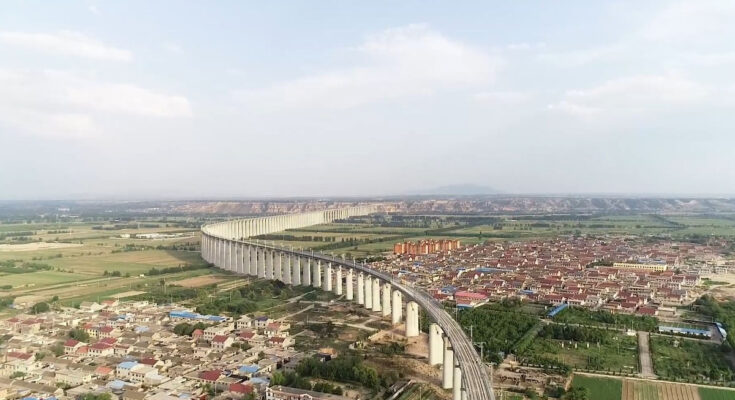The Haoji Railway Bridge in China holds the prestigious title of the longest railway bridge in the world, stretching an astonishing 1,813 kilometers. Designed primarily for coal transportation, this engineering marvel serves as a vital artery in China’s vast rail network. Built at a staggering cost of approximately 28 billion US dollars, the bridge plays a crucial role in transporting 200 million tons of coal annually from the resource-rich regions of Inner Mongolia and Shanxi to the energy-hungry southern provinces of China.
Historically, coal transportation in China relied heavily on coastal shipping routes, which took around 20 days to complete the journey from the northern coal mines to the south. However, the Haoji Railway dramatically revolutionized this process, slashing travel time to just three days. This not only enhances efficiency but also ensures a more stable and secure supply of coal, reducing dependency on sea routes that are vulnerable to weather disruptions and geopolitical risks.
The railway is a heavy-haul system, equipped with 1,435 mm standard gauge tracks. Unlike China’s high-speed railways that cater to passenger travel, this line is exclusively dedicated to freight, specifically designed to accommodate the immense weight and volume of coal shipments. Its robust infrastructure allows the railway to handle massive loads while maintaining safety and efficiency. The entire project was undertaken by China Railway, the country’s national rail operator, in collaboration with major coal mining corporations that provided financial backing.
Approval for the ambitious project was granted in 2014, and within just five years, the railway was completed and inaugurated on September 28, 2019. The speed at which the construction was carried out is a testament to China’s engineering prowess and its ability to execute large-scale infrastructure projects with remarkable efficiency. The railway was designed to operate at a maximum speed of 120 kilometers per hour, ensuring a steady flow of coal to power industries and households across the southern regions.
One of the primary objectives of the Haoji Railway was to alleviate congestion on existing coal transportation routes. Before its construction, coal was primarily transported through shipping lanes and conventional rail networks, which often faced bottlenecks and logistical challenges. By establishing a dedicated coal railway, China not only optimized coal transportation but also significantly reduced the strain on its maritime routes and other rail lines. Additionally, the railway connects with several existing rail networks, allowing it to share maintenance facilities and integrate seamlessly into China’s broader transportation infrastructure.
Beyond its economic and logistical advantages, the Haoji Railway Bridge represents a significant step toward improving China’s energy security. By ensuring a more reliable and efficient coal supply chain, the railway helps stabilize energy production, a critical factor for sustaining China’s rapid industrial growth. The reduced transit time and improved efficiency also contribute to cost savings, benefiting both coal producers and consumers.
Moreover, the project highlights China’s commitment to advancing its railway infrastructure. As the country continues to develop its high-speed rail network for passenger travel, it is simultaneously investing in specialized freight railways to enhance logistics and transportation efficiency. The Haoji Railway serves as a model for future large-scale railway projects, showcasing the potential of dedicated freight corridors in streamlining the movement of essential resources.
In conclusion, the Haoji Railway Bridge is much more than just a record-breaking structure; it is a game-changer in China’s coal transportation landscape. By cutting down transit time from 20 days to just three, reducing reliance on coastal shipping, and integrating seamlessly into the existing railway network, it exemplifies strategic planning and engineering excellence. As China continues to modernize its transportation infrastructure, the Haoji Railway stands as a remarkable achievement that underscores the country’s ability to execute ambitious projects that have far-reaching economic and logistical impacts.



